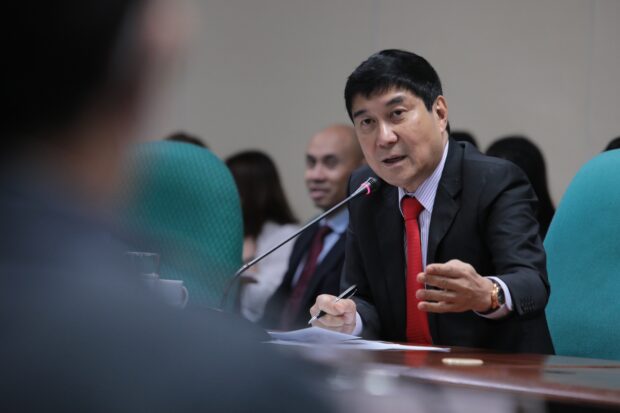
Sen. Raffy Tulfo scrutinizes the plans of the Department of Energy and other power stakeholders to provide long-term solutions to power supply shortages. Senate PRIB photo / Voltaire F. Domingo
MANILA, Philippines — The national security concerns bundled with the State Grid Corporation of China’s (SGCC) 40-percent stake in the National Grid Corporation of the Philippines (NGCP) have long been a concern of lawmakers.
But the sole operator of the country’s power grid on Wednesday maintained that this is not an issue.
During the Senate energy panel’s inquiry into the country’s power woes, Senator Raffy Tulfo asked NGCP Assistant Corporate Secretary Ronald Concepcion if the country’s power grid operator being partly owned by the SGCC poses a national security threat.
Tulfo cited intelligence reports his office had received, claiming that the SGCC has remote access to the country’s power transmission system.
“That’s not correct because, in the first place, as I said, only Filipinos are manning the (NGCP) substations,” Concepcion said.
Unsatisfied with the answer, Tulfo asked the NGCP official how certain he was of his claim.
Senator Risa Hontiveros further argued that Concepcion’s claim is not easy to make.
“It’s not easy to say that when a foreign country’s state-owned enterprise has the obligation to collect information and intelligence reports about our country and government and give it to their government. Beijing, in particular, is a country that is far from being our friend, especially with the way they treat us in the West Philippine Sea,” she said in Filipino.
The Philippines’ ties with Asian giant China have soured over the decades due to tensions in the South China Sea.
Beijing claims nearly all of the South China Sea, including the West Philippine Sea–waters within the exclusive economic zone of the Philippines.
NGCP vulnerability
In 2019, security concerns about Chinese ownership of the NGCP were already raised in the Senate. But the NGCP had then said there was no need to be alarmed since the SGCC’s investment is “limited only to being a technical adviser.”
READ: NGCP on security risk: Chinese just technical advisers
Concepcion said former National Security Adviser Hermogenes Esperon even inspected the NGCP’s headquarters and regional offices in 2020 to check if the SGCC has remote access to the country’s power grid.
But Tulfo pointed out that Esperon did not check the facilities of the SGCC.
“Until you verify that the SGCC is clean and has no remote access, I wouldn’t believe whatever you’ll tell us. I would still believe they have access remotely. The SGCC can, if it wants to, sabotage our national grid,” he said.
The senator also said that Esperon had told the Senate then that the NGCP was vulnerable to security threats.
But it shouldn’t spark panic since measures can be adopted to allow the NGCP to continue its operations, Esperon said.
READ: PH’s power grid hounded by security threats, countermeasures on – Esperon
“There’s no such thing as a hundred percent invulnerable cybersecurity system,” Concepcion argued.
But Tulfo and Hontiveros both argued that the vulnerability is much bigger, especially since a foreign entity has 40 percent ownership of the NGCP.
“Definitely, it is a vulnerability – the hefty share of a state-owned enterprise from a foreign country, which has not been friendly [and] has been hostile to us, especially in our waters,” Hontiveros said.
Calls for the government to regain control of the NGCP have been reignited following a series of recent flops involving the power grid operator.
President Ferdinand Marcos Jr. said the government would do so if deemed necessary. He also agreed to the proposal to thoroughly review NGCP operations.
NGCP background
According to the Philippine Daily Inquirer Research, the NGCP, a joint venture comprised of State Grid International Development Ltd., Monte Oro Grid Resources Corp., and Calaca High Power Corp, manages the electrical infrastructure in the Philippines.
A subsidiary of the SGCC owns 40 percent of the partnership, while Monte Oro, the former business of the Ricky Razon group, owns thirty percent, and Calaca High Power Corp. owns the remaining thirty percent.
As part of the country’s privatization efforts, the government-owned National Transmission Corporation transferred control of the power transmission grid to privately-held NGCP in January 2009.
The concession agreement authorized by legislation signed on December 1, 2008, became effective on December 20, 2008. The concession agreement has a 25-year term that may be extended for an additional 25 years for $3.95 billion.
NGCP paid $987.5 million (equivalent to 25% of the total) at the time of the takeover, with the remainder to be paid in semiannual installments over 20 years.
In March 2010, OneTaipan Holdings, owned by Henry Sy Jr., paid $350 million to Monte Oro for a 30% stake while Calaca High Power of the Coyiuto Group and State Grid Industry Development Ltd. of the Chinese Group maintained their stakes in NGCP.
Some notable businessmen comprise NGCP’s Board of Directors, including Henry Sy Jr., Robert Coyiuto Jr., and Zhu Guangchao of SGCC. The board includes Anthony Almeda, attorney Paul Sagayo Jr., Shan Shewu, Liu Ming, and Liu Xinhua. In March 2018, Henry Sy Jr. stepped down as President and CEO of NGCP and Almeda was promoted to the position.
READ: Marcos: Gov’t to reclaim control of NGCP if necessary